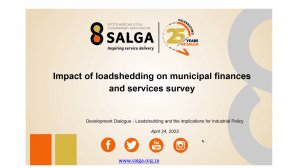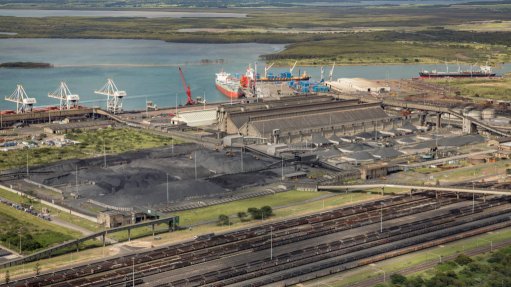Loadshedding hindering industrialisation


South African Local Government Association Sustainable Energy specialist Silas Mulaudzi outlines the impact of loadshedding on municipal finances and services, as indicated in a survey undertaken by the entity.
Seifsa COO Tafadzwa Chibanguza
The provision of reliable and affordable baseload electricity is fundamental to industrialisation; therefore, the electricity crisis currently being faced by the country and the metals and engineering sector, presents the most severe binding constraint to current survival and long-term economic prospects.
This was noted by industry organisation Steel and Engineering Industries Federation of Southern Africa (Seifsa) COO Tafadzwa Chibanguza. He was speaking during an economic research unit Trade & Industrial Policy Strategies (TIPS) development dialogue titled 'Loadshedding and the implications for industrial policy – How to make the economy more resilient'.
Chibanguza presented findings from a survey conducted by Seifsa.
Seifsa’s board in January instructed it to undertake a loadshedding impact assessment in the metals and engineering sector, with the view that the outcomes would assist the office in its advocacy work in the electricity supply industry.
The survey period was from February 2022 to February this year.
Respondents indicated that production in the sector declined as much as 34.2% weighted as a result of the impact of loadshedding.
However, factoring in the results from this survey, the forecast for this year is set to deteriorate to -5.3% (a deterioration from the -2.2% originally calculated at the beginning of the year).
Chibanguza says that, in 2022, employment in the sector increased by 0.8% or 1 622 jobs.
However, he notes that the link between production and employment has been weakening.
The survey shows that a quarter of respondents, 24.2%, have reduced headcount as a result of the energy crisis, by as much as a quarter of their employment, equating to 9 432 people.
In terms of investment, Chibanguza outlines that real gross domestic fixed investment declined by 9.2% in 2022.
Fixed capital stock has also continued to deteriorate, as net investment has not been sufficient, he adds.
This presents long-term risks to competitiveness, Chibanguza warns.
He emphasises that it is “concerning” that 42.6% of companies have indicated that they have cancelled investments and/or expansion plans owing to the uncertainty presented by the electricity crisis.
The value of these investments amounts to R2.64-billion with the potential of creating 1 620 new jobs, Chibanguza outlines.
He also highlights that on a weighted average basis, companies have indicated increases in monthly operating costs to the extent of 24.9% from the extensive use of generators.
This does not bode well for a sector where input costs are running at 17.6%, year-on-year to February 2023, Chibanguza avers.
Factoring in the results of the survey to the input cost model results in input costs increasing by 1.7 percentage points to 19.3% for the sector.
“The less supportive demand environment means that these companies cannot easily pass on these costs, thereby resulting in considerable squeeze and ultimately impacting long-term sustainability,” Chibanguza says.
In analysing alternative energy investments, Chibanguza indicates that the investment amount of R985-milllion is considerable when put into perspective that it accounts for 37% of the value of investments cancelled.
“This again highlights the points that Seifsa has repeatedly stressed that companies are sacrificing scarce long-term capital to ensure immediate survival, presenting long-term adverse implications regarding the sustainability of the sector,” Chibanguza emphasises.
He highlights that low hanging areas of intervention include fast-tracking the deployment of photovoltaic installations at a residential level, to free up the baseload grid capacity; demand side management (with incentives), particularly aggregating smaller loads; and the installed diesel generator capacity presenting an opportunity for manufacturers to feed capacity into the grid.
TIPS senior economist Dr Neva Makgetla, meanwhile, emphasises that the country needs a paradigm shift to address loadshedding as part of a broader structural change.
She points out that the current technological transition is particularly challenging for the country given its unusual dependency on coal and how this has shaped the economy and the electricity system historically.
Strategic responses to this could entail maximising benefits from new, more competitive technologies and systems; ensuring a just transition; and accepting closure of obsolete assets, she proffers.
Makgetla also notes that in a deeply unequal democracy, industrial policy will fail if it focuses narrowly on growth and competitiveness and diversification away from mining.
By extension, she avers that responses to loadshedding have to ensure more equitable outcomes as well as reduce the costs to established business.
Options for mitigating loadshedding include affordable energy during loadshedding, such as solar equipment and storage, while also maintaining production and quality of life, Makgetla says.
She emphasises that above all, what is required is much larger and faster measure to support businesses including emerging and smaller enterprises, as well as working-class communities.
Article Enquiry
Email Article
Save Article
Feedback
To advertise email advertising@creamermedia.co.za or click here
Announcements
What's On
Subscribe to improve your user experience...
Option 1 (equivalent of R125 a month):
Receive a weekly copy of Creamer Media's Engineering News & Mining Weekly magazine
(print copy for those in South Africa and e-magazine for those outside of South Africa)
Receive daily email newsletters
Access to full search results
Access archive of magazine back copies
Access to Projects in Progress
Access to ONE Research Report of your choice in PDF format
Option 2 (equivalent of R375 a month):
All benefits from Option 1
PLUS
Access to Creamer Media's Research Channel Africa for ALL Research Reports, in PDF format, on various industrial and mining sectors
including Electricity; Water; Energy Transition; Hydrogen; Roads, Rail and Ports; Coal; Gold; Platinum; Battery Metals; etc.
Already a subscriber?
Forgotten your password?
Receive weekly copy of Creamer Media's Engineering News & Mining Weekly magazine (print copy for those in South Africa and e-magazine for those outside of South Africa)
➕
Recieve daily email newsletters
➕
Access to full search results
➕
Access archive of magazine back copies
➕
Access to Projects in Progress
➕
Access to ONE Research Report of your choice in PDF format
RESEARCH CHANNEL AFRICA
R4500 (equivalent of R375 a month)
SUBSCRIBEAll benefits from Option 1
➕
Access to Creamer Media's Research Channel Africa for ALL Research Reports on various industrial and mining sectors, in PDF format, including on:
Electricity
➕
Water
➕
Energy Transition
➕
Hydrogen
➕
Roads, Rail and Ports
➕
Coal
➕
Gold
➕
Platinum
➕
Battery Metals
➕
etc.
Receive all benefits from Option 1 or Option 2 delivered to numerous people at your company
➕
Multiple User names and Passwords for simultaneous log-ins
➕
Intranet integration access to all in your organisation




















